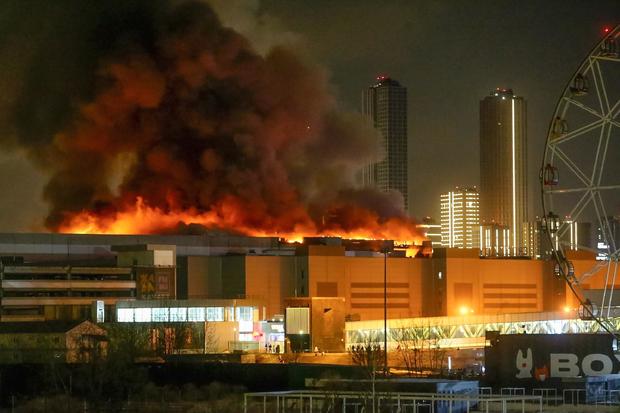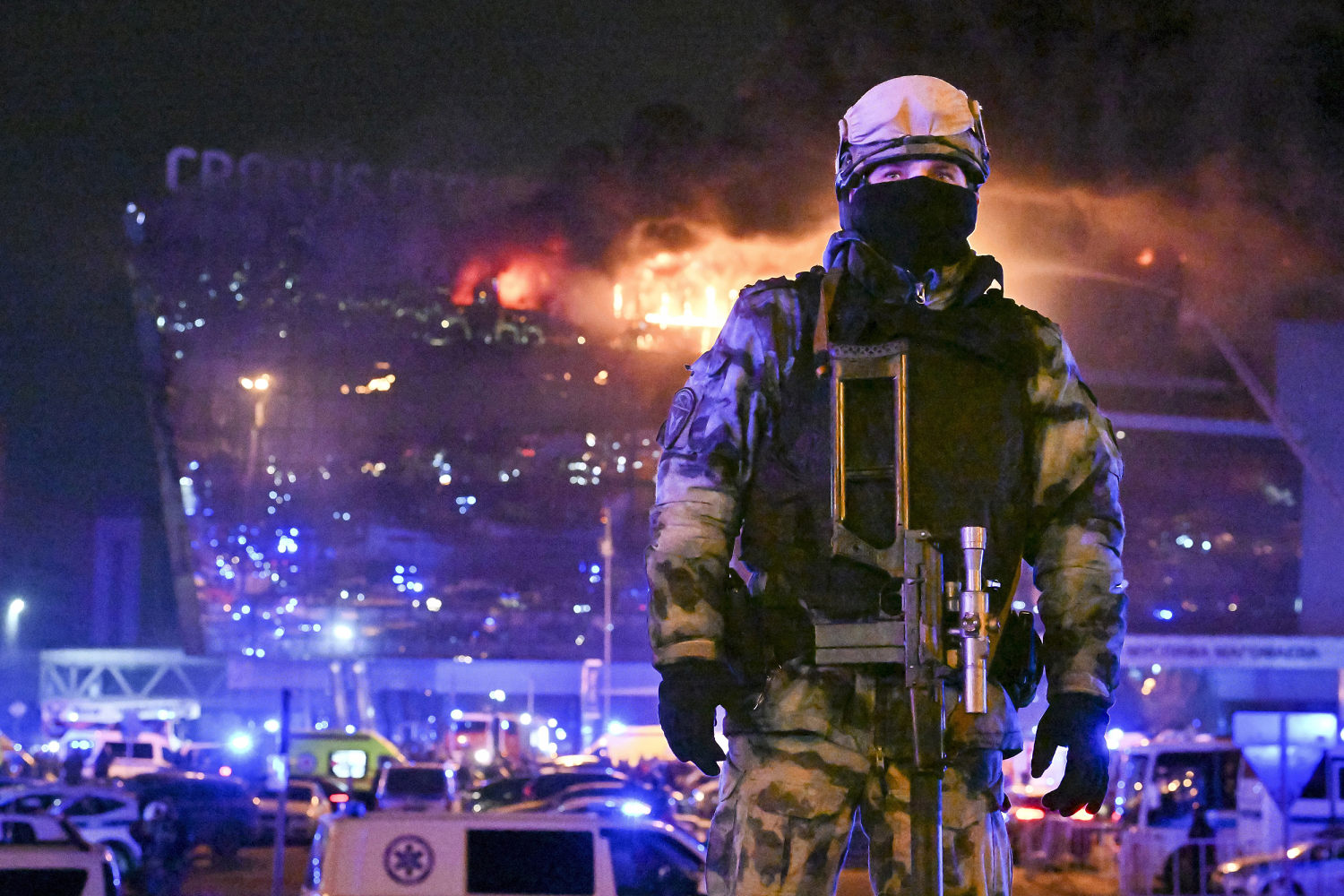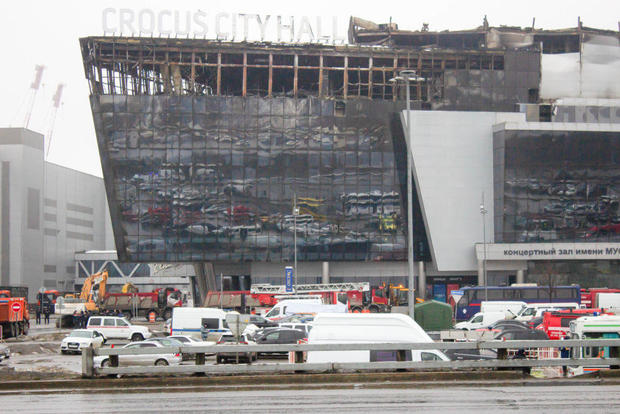Moscow — Four men accused of staging the Russia concert hall attack that killed more than 130 people appeared before a Moscow court Sunday showing signs of severe beatings as they faced formal terrorism charges. One appeared to be barely conscious during the hearing.
A court statement said two of the suspects accepted their guilt in the assault after being charged in the preliminary hearing, though the men’s condition raised questions about whether they were speaking freely. There had been earlier conflicting reports in Russian media outlets that said three or all four men admitted culpability.
Moscow’s Basmanny District Court formally charged Dalerdzhon Mirzoyev, 32; Saidakrami Rachabalizoda, 30; Shamsidin Fariduni, 25; and Mukhammadsobir Faizov, 19, with committing a group terrorist attack resulting in the death of others. The offense carries a maximum sentence of life imprisonment.
The court ordered that the men, all of whom are citizens of Tajikistan, be held in pre-trial custody until May 22.
Russian media had reported that the men were tortured during interrogation by the security services, and Mirzoyev, Rachabalizoda and Fariduni showed signs of heavy bruising, including swollen faces,
Rachabalizoda also had a heavily bandaged ear. Russian media said Saturday that one of the suspects had his ear cut off during interrogation. The Associated Press couldn’t verify the report or the videos purporting to show this.
The fourth suspect, Faizov, was brought to court from a hospital in a wheelchair and sat with his eyes closed throughout the proceedings. He was attended by medics while in court, where he wore a hospital gown and trousers and was seen with multiple cuts.
Court officials said Mirzoyev and Rachabalizoda admitted guilt for the attack after being charged.
The hearing came as Russia observed a national day of mourning of the attack Friday on the suburban Crocus City Hall concert venue that killed at least 137 people.
Rescuers continued to search the damaged building and the death toll rose as more bodies were found as family and friends of some of those still missing waited for news. Moscow’s Department of Health said Sunday it had begun identifying the bodies of those killed via DNA testing, adding the process would take at least two weeks.
The attack, which has been claimed by an ISIS affiliate, is the deadliest on Russian soil in years.
Finger pointing in full force
Russian authorities arrested the four suspected attackers Saturday, with seven more detained on suspicion of involvement in the attack, Russian President Vladimir Putin said in an address to the nation Saturday night.
Putin appears to be trying to tie Ukraine to the attack, something its government firmly denies.
He called the attack “a bloody, barbaric terrorist act” and said Russian authorities captured the four as they were trying to escape to Ukraine through a “window” prepared for them on the Ukrainian side of the border.
A United States intelligence official told CBS News the U.S. has intelligence confirming that ISIS was responsible and U.S. intelligence has no reason to doubt those claims.
The U.S. Embassy in Russia had also previously advised Americans to stay away from concert venues because of the potential of a terrorist attack. The U.S. intelligence official confirmed to CBS News that the U.S. provided intelligence to Russia regarding the potential for an attack, under the intelligence community’s Duty to Warn requirement.
“ISIS bears sole responsibility for this attack. There was no Ukrainian involvement whatsoever,” National Security Council spokeswoman Adrienne Watson said in a statement.
Russian media broadcast videos that apparently showed the detention and interrogation of the suspects, including one who told the cameras he was approached by an unidentified assistant of an Islamic preacher and paid to take part in the raid.
Putin didn’t mention ISIS in his speech, and Kyiv accused him and other Russian politicians of falsely linking Ukraine to the assault to stoke fervor for Russia’s war in Ukraine, which recently entered its third year.
The raid was a major embarrassment for Putin and happened just days after he cemented his grip on the country for another six years in a vote that followed the harshest crackdown on dissent since the Soviet times.
Some commentators on Russian social media questioned how authorities, who have relentlessly suppressed any opposition activities and muzzled independent media, failed to prevent the attack despite the U.S. warnings.
ISIS, which fought against Russia during its intervention in the Syrian civil war, has long targeted Russia. In a statement posted by the group’s Aamaq news agency, the ISIS Afghanistan affiliate said it had attacked a large gathering of “Christians” in Krasnogorsk.
The group issued a new statement Saturday on Aamaq, saying the attack was carried out by four men who used automatic rifles, a pistol, knives and firebombs. It said the assailants fired at the crowd and used knives to kill some concertgoers, casting the raid as part of ISIS’ ongoing war with countries it says are fighting against Islam.
In October 2015, a bomb planted by ISIS downed a Russian passenger plane over Sinai, killing all 224 people on board, most of them Russian vacationers returning from Egypt.
The group, which operates mainly in Syria and Iraq but also in Afghanistan and Africa, also has claimed responsibility for several attacks in Russia’s volatile Caucasus and other regions in past years. It recruited fighters from Russia and other parts of the former Soviet Union.
As Russia mourns, frantic families of the missing seek answers
Events at cultural institutions were canceled Sunday, flags were lowered to half staff and television entertainment and advertising were suspended, according to state news agency RIA Novosti. A steady stream of people added to a makeshift memorial near the burned-out concert hall, creating a huge mound of flowers.
“People came to a concert, some people came to relax with their families, and any one of us could have been in that situation. And I want to express my condolences to all the families that were affected here and I want to pay tribute to these people,” Andrey Kondakov, one of the mourners who came to lay flowers at the memorial, told the AP.
“It is a tragedy that has affected our entire country,” kindergarten employee Marina Korshunova said. “It just doesn’t even make sense that small children were affected by this event.” Three children were among the dead.
Igor Pogadaev was desperately seeking any details about his wife, Yana Pogadaeva, who went to the concert. The last he heard from her was when she sent him two photos from the Crocus City Hall music venue.
After Pogadaev saw the reports of gunmen opening fire on concertgoers, he rushed to the site, but couldn’t find her in the numerous ambulances or among the hundreds of people who had made their way out of the venue.
“I went around, searched, I asked everyone, I showed photographs. No one saw anything, no one could say anything,” Pogadaev told the AP in a video message.
He watched flames bursting out of the building as he made frantic calls to a hotline for relatives of the victims, but received no information.
As the death toll mounted Saturday, Pogodaev scoured hospitals in the Russian capital and the Moscow region, looking for information on newly admitted patients.
His wife wasn’t among the 182 reported injured, nor on the list of 60 victims authorities had already identified, he said.
The Moscow Region’s Emergency Situations Ministry posted a video Sunday showing equipment dismantling the damaged music venue to give rescuers access.





